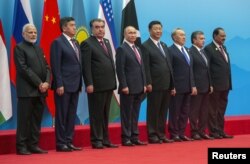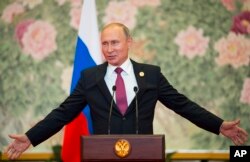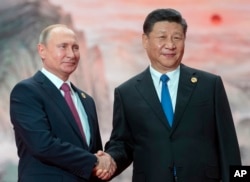It was a calmer summit, but drew far less Western media attention than the fractious G7 gathering in Canada, which ended in disarray in an escalating dispute over trade and tariffs.
Half a world away at a carefully choreographed annual meeting of the Shanghai Cooperation Organization (SCO) in Qingdao, China, there were no death-grip handshakes, personal jibes or Twitter skirmishes between the leaders of Russia, China, India, Kazakhstan, Kyrgyzstan, Pakistan, Tajikistan and Uzbekistan.
And Russian and Chinese officials, as well as their state-run media outlets, Sunday sought to stress the contrast of unity in the Chinese port city of Qingdao with the division and ill-temper in Quebec as a tale of two summits.
During a Sunday, news conference in Qingdao, Russian leader Vladimir Putin offered an oblique commentary on the G7’s disarray, noting the combined purchasing power of the members of the Shanghai Cooperation Organization (SCO) is greater than that of the G7.
And Putin didn’t hesitate to note growing friction between the U.S. and Europe. It is a theme he has pressed repeatedly in recent weeks, notably during a recent trip to Austria, revealing a growing confidence in trying to drive a wedge between Washington and its Western allies, according to Ivan Kurilla, a history professor at the European University at St. Petersburg.
In Qingdao, the Russian President highlighted the possibility of the U.S. imposing tariffs on foreign-manufactured cars, something the Trump administration has threatened to do. “This might really hurt the economic interests of many countries, first of all, of course, of the European ones,” Putin said.
His Chinese counterpart Xi Jinping also referenced the disputes at the G7 meeting over President Donald Trump’s decision to impose tariffs on steel and aluminum, warning against “selfish, short-sighted” policies and extolling free-trade.
He failed to note, though, China’s own tariffs on imports and mounting criticism by Western states of what they see as protectionist trading practices.
Founded in 2001, the SCO was created as a forum to resolve border and security issues, but experts say that increasingly in recent years Moscow and Beijing have used it as platform to counter American and Western influence in Central Asia.
This year, saw India and Pakistan join as full members, which Chinese and Russian leaders saying their entry marks a new chapter for the SCO.
Chinese and Russian leaders deny they are using the bloc as a tool of geo-strategic rivalry with the West.
On Sunday a Communist Party newspaper, The Global Times, contrasted the SCO with NATO and the G7, saying that the American-led multilateral organizations want to “consolidate the global economic order that is favorable to the Western world. The SCO “is not a tool for geopolitical games, seeking hegemony or engaging in international confrontation,” the paper editorialized.
Nonetheless, it crowed: “[The] G-7, the rich countries’ club which is supposed to better promote development of Western economies, is now all dog-eat-dog.” And in the past Russian leaders have pointed to the SCO as important in trying to build a "multipolar world order."
More subtle than their media outlets, the bloc’s leaders in Qingdao maintained the counterpoint with the G-7 at their two-day meeting, singing each other’s praises. Xi Jingping announced Putin is his “best, most intimate friend” and noted the SCO is a “model for international win-win cooperation” that “will benefit not only its eight members, but also the world at large.”
“Unquestionably there is a shared belief, or vision, held by all SCO members that the age of American domination, and of West-dominated global institutions, is coming to an end and that new global institutions should be developed with a much stronger Asian influence [and possibly African and Latin American as well], at least in parallel with the Western order, and in some areas in defiant competition,” says David Howell, a former British foreign minister and now chairman of the House of Lords international relations committee.
But for all of the talk of a new era of cooperation between SCO members, some analysts see the Beijing and Moscow-led organization as more of a propaganda platform used to paper over sharp differences between its members and one whose aims remain to be defined.
Russia and China “differ over the organization’s exact purpose and scope,” argues Alexander Cooley, a political scientist at New York’s Columbia University.
In a commentary on the eve of the Qingdao meeting, he noted, “Many of the organization’s high-profile initiatives continue to be aspirational and unfilled — especially in the area of economic and energy cooperation — while the organization’s strong norm of consensus effectively means that the body is rarely used to ‘problem-solve’ or host contentious debates among its members.”







